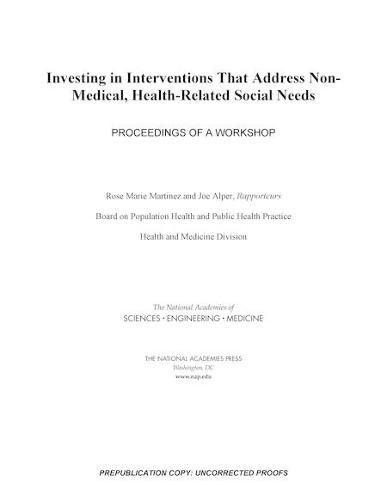Readings Newsletter
Become a Readings Member to make your shopping experience even easier.
Sign in or sign up for free!
You’re not far away from qualifying for FREE standard shipping within Australia
You’ve qualified for FREE standard shipping within Australia
The cart is loading…






With U.S. health care costs projected to grow at an average rate of 5.5 percent per year from 2018 to 2027, or 0.8 percentage points faster than the gross domestic product, and reach nearly $6.0 trillion per year by 2027, policy makers and a wide range of stakeholders are searching for plausible actions the nation can take to slow this rise and keep health expenditures from consuming an ever greater portion of U.S. economic output. While health care services are essential to heath, there is growing recognition that social determinants of health are important influences on population health. Supporting this idea are estimates that while health care accounts for some 10 to 20 percent of the determinants of health, socioeconomic factors and factors related to the physical environment are estimated to account for up to 50 percent of the determinants of health. Challenges related to the social determinants of health at the individual level include housing insecurity and poor housing quality, food insecurity, limitations in access to transportation, and lack of social support. These social needs affect access to care and health care utilization as well as health outcomes. Health care systems have begun exploring ways to address non-medical, health-related social needs as a way to reduce health care costs.
To explore the potential effect of addressing non-medical health-related social needs on improving population health and reducing health care spending in a value-driven health care delivery system, the National Academies of Science, Engineering, and Medicine held a full-day public workshop titled Investing in Interventions that Address Non-Medical, Health-Related Social Needs on April 26, 2019, in Washington, DC. The objectives of the workshop were to explore effective practices and the supporting evidence base for addressing the non-medical health-related social needs of individuals, such as housing and food insecurities; review assessments of return on investment (ROI) for payers, healthy systems, and communities; and identify gaps and opportunities for research and steps that could help to further the understanding of the ROI on addressing non-medical health-related social needs. This publication summarizes the presentations and discussions from the workshop.
$9.00 standard shipping within Australia
FREE standard shipping within Australia for orders over $100.00
Express & International shipping calculated at checkout
With U.S. health care costs projected to grow at an average rate of 5.5 percent per year from 2018 to 2027, or 0.8 percentage points faster than the gross domestic product, and reach nearly $6.0 trillion per year by 2027, policy makers and a wide range of stakeholders are searching for plausible actions the nation can take to slow this rise and keep health expenditures from consuming an ever greater portion of U.S. economic output. While health care services are essential to heath, there is growing recognition that social determinants of health are important influences on population health. Supporting this idea are estimates that while health care accounts for some 10 to 20 percent of the determinants of health, socioeconomic factors and factors related to the physical environment are estimated to account for up to 50 percent of the determinants of health. Challenges related to the social determinants of health at the individual level include housing insecurity and poor housing quality, food insecurity, limitations in access to transportation, and lack of social support. These social needs affect access to care and health care utilization as well as health outcomes. Health care systems have begun exploring ways to address non-medical, health-related social needs as a way to reduce health care costs.
To explore the potential effect of addressing non-medical health-related social needs on improving population health and reducing health care spending in a value-driven health care delivery system, the National Academies of Science, Engineering, and Medicine held a full-day public workshop titled Investing in Interventions that Address Non-Medical, Health-Related Social Needs on April 26, 2019, in Washington, DC. The objectives of the workshop were to explore effective practices and the supporting evidence base for addressing the non-medical health-related social needs of individuals, such as housing and food insecurities; review assessments of return on investment (ROI) for payers, healthy systems, and communities; and identify gaps and opportunities for research and steps that could help to further the understanding of the ROI on addressing non-medical health-related social needs. This publication summarizes the presentations and discussions from the workshop.